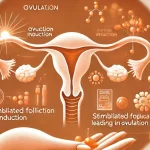Ovulation and fertility
Women are most fertile around the time of ovulation, when the body releases a mature egg from the ovary. After the egg has hatched Released, it travels to the fallopian tubes, where it can be fertilized by sperm. Once the egg is released, it has 12 to 24 hours to be fertilized.
On average, sperm cells can remain in a woman's body for three days survive and take up to five days to fertilize the egg.
The chance of becoming pregnant is greatest if there are living sperm cells present in the fallopian tubes during ovulation. So how do you know if you have a are you ovulating?
Does the body show signs of ovulation?
Most women ovulate within four days of their midpoint menstrual cycle. One way to keep track of this is with a calendar Use to track the length and midpoint of the menstrual cycle to hold.
Signs of ovulation include:
- Change in cervical mucus
- Before ovulation, there may be an increase in clear, wet, and slippery discharge from the vagina. After ovulation, the secretions become thicker and cloudier or disappear.
- Change in body temperature
- Basal body temperature is the body temperature at rest and increases slightly during ovulation. Tracking basal body temperature every morning before getting out of bed can indicate a pattern in temperatures. Women are most fertile during the two to three days before basal body temperature rises.
If watching for changes in cervical mucus or keeping track of the basal body temperature are not effective, some people use ovulation predictors to track the rise in hormones that occurs before the ovulation.
Can I use an ovulation app or do I need an ovulation kit
to use?
When couples are trying to get pregnant, they can start with a app. Every woman has different needs when it comes to predicting of ovulation. All women should keep track of their cycle and a great place to do that is with an app. After the details about the menstruation have been entered, the app displays the fertile time of the cycle on. It is recommended to do this at least every other day community to have around their most fertile time.
If a couple has been trying to get pregnant for more than six months and are unable to get pregnant, an ovulation kit can be used, in addition to it using the app will be useful.
Why should I use an ovulation kit?
Ovulation kits look for a rise in luteinizing hormone, which causes women to ovulate and release an egg. When a woman is ovulating, she is in the most fertile part of her cycle and has they are most likely to become pregnant. If you are aware of this, can increase a woman's chances of becoming pregnant.
When should I use the ovulation kit?
Typically, a woman's menstrual cycle lasts 24 to 38 days.
A standard reference period for a menstrual cycle is 28 days.
With a 28 day cycle, a woman will ovulate on day 14 or 14 days before her next period starts. With a shorter or longer one cycle, the day of ovulation varies.
Start testing on the first day that indicates a fertile day on the ovulation app and test your urine once a day. Gives a positive result that you must have intercourse that day and the day after.
How do I read the ovulation kits?
Like pregnancy tests, ovulation tests display indicator lines, where one line is a control line. If the second line is equally dark or is darker than the first line, this indicates that you are ovulating soon.
These tests can be more difficult to read, but are the cheapest.
Some digital ovulation tests give “yes” or “no” as an answer using words or images, such as smiling faces, to communicate indicate that you will ovulate soon.
Other digital tests can tell how fertile you are by your fertile days, which are also indicated with an app.
Look for the spike as a positive result, indicating that you will soon have a you are ovulating.
Not getting the results you're looking for?
Ovulation kits are not perfect. False positives or consistent negatives can occur. This can be caused by eggs that fail release, an excessive amount of the luteinizing hormone or a other ovulation disorder. If you are concerned about your results, please contact your health care team to discuss your fertility discuss.








